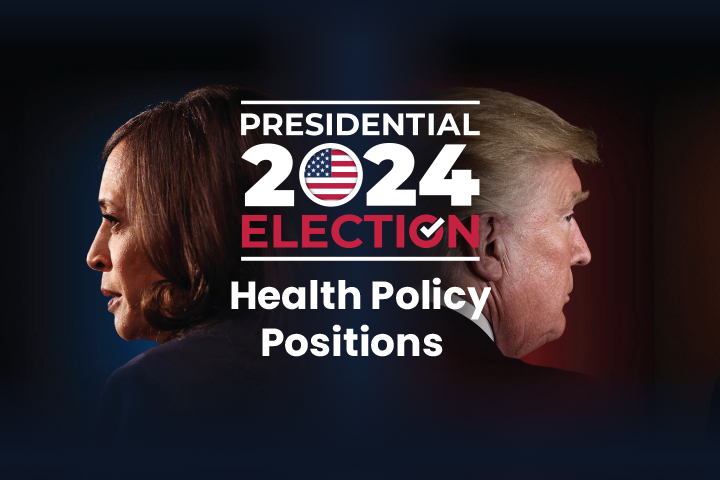October 29, 2024
Election 2024: Key Healthcare Changes for Your Practice
Healthcare is a pivotal issue in the 2024 presidential election. With rising operational costs, changing care models, and increasing patient demands, what happens in Washington will impact the entire healthcare landscape.
Medical practices and hospitals will be closely watching, as these policies could change reimbursement, care delivery, and the financial stability of healthcare organizations.
Donald Trump and Kamala Harris have two different healthcare visions – each will impact providers from independent practices to large hospital systems. Understanding the potential outcomes of these policies is crucial for healthcare leaders preparing for the changes ahead.
The Reimbursement Landscape
Rising Costs, Shrinking Payments
Reimbursement is a big deal for hospitals and medical practices as costs go up and payments can’t keep up. Independent practices need policies that simplify payments and provide more financial stability.
Harris’s Value-Based Care Approach
Kamala Harris wants to increase reimbursements for primary care providers and value-based care models to support independent practices. Hospitals will also benefit from these incentives and a focus on preventive care.1
Actionable Insight: Practices should manage their scheduling and care coordination to handle more patients under Harris’s plan.
Trump’s Focus on Specialties
Trump’s focus is on simplifying Medicare reimbursement for specialty services. But concerns remain about funding instability, especially for hospitals and practices that rely on government payers.2
Recap: Harris offers more, and Trump focuses on specialty reimbursement and simplifying some processes.
Addressing Prescription Drug Costs
Harris’s Plan to Lower Drug Prices
Harris’s plan allows Medicare to negotiate drug prices which could lower costs for hospitals and practices. This could improve patient adherence and outcomes. The Congressional Budget Office estimates this could save $50 billion over the next decade.3
Trump’s Drug Importation Strategy
Trump has supported drug importation from countries like Canada to lower prices, but his healthcare plan doesn’t have details on this.
Recap: Harris has a direct path to lower drug costs, Trump’s importation plan requires navigating regulatory hurdles.
Expanding Mental Health Integration
Mental Health is a Growing Issue
The pandemic has emphasized the importance of mental health. Harris wants to increase access, especially in underserved areas, and ease the burden on hospitals and practices.
Actionable Insight: Practices should add mental health screenings and referral programs to align with expanded access.
Trump’s Limited Mental Health Proposals
Trump’s plan has been vague on mental health so providers need clearer commitments to meet the growing demand.
Recap: Harris has a clearer path for mental health integration, Trump’s is less defined.
Reproductive Health Policies
Harris’s Federal Protections
Harris wants to codify reproductive rights at the federal level so providers have consistent access to services like contraception and maternal health which simplifies compliance.
Trump’s State-Level Approach
Trump’s state-based approach would mean varying access to reproductive health services which would introduce complexities for providers that operate across regions.
Recap: Harris offers national stability, and Trump’s state-based approach has operational complexities.
State Control and Block Grants
Medicaid Block Grants Under Trump
Trump wants to shift Medicaid funding to states through block grants which could mean reduced coverage in some areas and more financial burden on hospitals and practices.
Harris’s Medicaid Expansion
Harris will expand Medicaid so there’s more consistent coverage and less financial burden on providers serving the uninsured.
Actionable Insight: Providers in states with potential Medicaid cuts should diversify revenue.
Recap: Trump’s Medicaid block grants require more work from providers, and Harris offers more stability.
The Bottom Line: Hospitals and Practices
Harris’s Impact: More Coverage, Predictable Income
If Harris wins, providers will have expanded coverage, better access to preventive care, and fewer financial barriers. Practices will see more patients but more predictable revenue.
Trump’s Impact: Medicaid Changes and Telehealth
If Trump wins, providers will have to adjust to state-level Medicaid changes. His support for telehealth and price transparency offers new opportunities but imposes more financial burden on practices serving the uninsured.
Healthcare leaders must stay informed and prepared. Win or lose, hospitals and practices will have to navigate these changes to stay financially healthy and deliver quality care to patients.
Sources
- Kaiser Family Foundation.Kff.org
- Council on Foreign Relations.Cfr.org
- Kaiser Family Foundation.Kff.org
